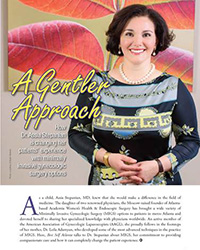Minimally Invasive Gynecologic Surgery (MIGS)
 Both advanced and early gynecologic surgical conditions can be treated using the MIGS approach.
Both advanced and early gynecologic surgical conditions can be treated using the MIGS approach.
Laparoscopic, robotic, vaginal, and hysteroscopic surgery are all forms of Minimally Invasive Gynecologic Surgery. These are surgeries performed through small incisions. Sometimes these surgeries require no incision at all. Dr. Assia Stepanian is an internationally recognized authority in MIGS, founder of SurgeryU, the world’s first and the largest professional platform for web-based education in MIGS.
For Dr. Stepanian’s background and commitment to minimally invasive approaches in gynecology, please see her bio.
Examples of conditions treated by MIGS are uterine fibroids (including advanced cases), pelvic pain, endometriosis, pelvic floor surgery (including cases in which the uterus descends completely outside of the vaginal canal), urinary incontinence, ovarian masses and adhesions (scar tissue), among other conditions. In addition, multiple forms of genital anomalies can be treated laparoscopically and hysteroscopically. However, there are very rare times when MIGS is contraindicated or would not be the method of choice. A consultation with a specialist in MIGS would be able to address this most effectively.
The main benefit of MIGS is that laparoscopy, whether or not it is performed robotically or with laparoscopic instruments, allows for superior visualization of the targeted tissue in surgery and an outstanding performance of the surgery through small incisions. Therefore, the precision of surgery increases and tissue handling becomes more intricate and gentle, with less tissue manipulation and less blood loss. In most MIGS surgeries the blood loss is of less than 25 – 50 ml, which is less than what is experienced during menstruation. Benefits of this approach include decreased risk of perioperative infection and an early return to normal activities both in life and work as compared with open surgery. In fact, some people return to work in only one or two weeks after surgery, even if the surgery is performed for an advanced disease.

Additionally, there is hardly any need for the use of narcotic medications post-operatively. Motrin is used as the primary medication for pain. Patients who receive the vaginal approach to surgery, which is the oldest of all minimally invasive approaches, have no abdominal incisions whatsoever and experience the same excellent recovery rates as laparoscopy. It is used when evaluation of the abdomen and upper aspect of the pelvis is not required. According to Dr. Stepanian, “Hysteroscopy is our inspectional and operative window into the woman’s uterus. It allows for early intervention in the office setting or surgical suites and often prevents the need for more invasive uterine surgery.”
It is Dr. Stepanian’s hope that patients, doctors, nurses, hospitals, insurance companies, and manufacturers combine their knowledge and abilities to best serve the needs of the patients. Academia of Women’s Health always welcomes new patients. We are very fortunate to receive referrals from many wonderful physicians and stay in close contact with them.
Conditions Treatable Using Minimally Invasive Techniques:
- Pelvic Pain
- Pelvic adhesions
- Endometriosis
- Heavy or Frequent Menstruation
- Adenomyosis
- Uterine Fibroids
- Endometrial polyps
- Postmenopausal bleeding
- Ovarian pathology
- Fallopian Tubes
- Mullerian Anomalies (Malformations)
- MRKH/vaginal agenesis
- Combined Mullerian anomalies
- Polycystic Ovarian Syndrome
- Decreased Ovarian Reserve
- Premature Ovarian Failure/Insufficiency
- Tubal infertility
- Pelvic Floor Prolapse
- Urinary Incontinence
- Cervical Pathology
- Treatment of ovarian, tubal, cervical and endometrial oncology (this is performed by GYN Oncology specialists; we refer for these conditions)
Academia continues to accept various insurance plans. Visit our Patient Portal for more information.
We communicate with your referring physicians on all needed items.
Because Dr. Stepanian specializes in the treatment of multiple conditions, multiple gynecologic conditions can be treated by her at the same time.
